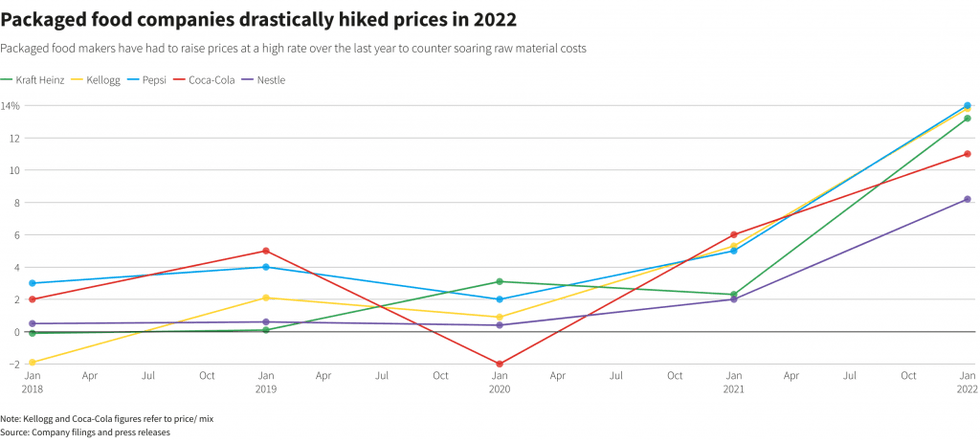Prices of everyday basics like Bounty paper towels and Cadbury chocolate may rise again this year while those of others like Clorox Co wipes and Diet Pepsi are likely to stay steady, as manufacturers make differing bets on the strength of the consumer and their brands.
Consumer goods makers' strategies on further price hikes depends on their leverage with retailers such as Walmart and Tesco, who are pushing back against more increases, how much consumers need and want the items and their arrangements for buying volatile commodities, some of which are falling in price.
Once-in-a-generation levels of inflation, stemming from pandemic supply chain snarls, government stimulus and the Ukraine war, have pinched shoppers' pocketbooks globally.
In Britain, consumers paid 16.7 per cent more for food in the month to Jan. 22 compared to the same period last year, while US prices for food eaten at and away from home rose 10.1 per cent in the 12 months ended in January.
But, there are small signs the pressure is easing, with US consumer prices a month earlier declining for the first time in two-and-a-half years, due in part to gas prices.
As the "tide is turning a little bit," some retailers are also now asking suppliers for "rollbacks" as the cost of fuel, for example, falls, another factor driving companies' decisions, said KPMG consultant Sunder Ramakrishnan.
"The retailer would drop the shelf price, because manufacturers agree to sell it for less to the retailer," Ramakrishnan said. "It's been a fairly recent phenomenon. Not a lot of manufacturers are willing to volunteer to cut price."
The cost of cardboard cases has decreased by as much as 50 per cent, and transportation costs have plummeted as well, by 25-30 per cent, Reuters reported last week. Some plastics and chemicals used in household goods have risen, executives have said, and labour remains costly.
Price hikes - or halts - are set to take center stage at the Consumer Analyst Group of New York annual conference on Feb. 20 in Boca Raton, Florida.
Different Predictions
After more than a year of consistent price hikes, some consumer goods makers such as Kraft Mac & Cheese manufacturer Kraft Heinz Co are pressing pause as they weigh consumer demand for their items.
Kraft's prices went up 13.2 percentage points in 2022 over the prior year, according to financial disclosures. US supermarket chain Kroger is promoting a 20-ounce bottle of Heinz ketchup for $2.49 - below the $3.18 average price per unit of the condiment according to IRI, a Chicago-based market research firm.
Kraft-Heinz chief execuitve Miguel Patricio said last week that private label, or store brands, are gaining market share, mainly from the company's competitors.
It's riskier for national brands to hike prices on products where consumers are increasingly buying store brand items, such as grocery and baby products, according to data from market research firm Numerator.
But other companies like Nestle, the world's biggest food company, continue to plan price hikes in the future to recoup margins squeezed by high labour and fuel costs, a whiplash for consumers aiming to make sense of their household expenses.
Prices on Nestle's products already rose 8.2 per cent last year, with an 11.75 ounce package of its Stouffer's French bread pizza selling for $3.48 at Walmart. Frozen pizza prices have risen about 14 per cent in the last year, according to IRI data.

Price, always a major factor for consumers along with quality, is now becoming even more important, said Mark Hosbein, an executive at consulting firm Magid. Magid's data from surveys shows that consumers are spending dramatically more on groceries, rent and gas, forcing them to cut back on savings and eat out less.
"Consumer sensitivity to prices is going up, even in the last couple months," Hosbein said, adding that data tracked by his firm shows shoppers are becoming less discriminating in what they buy and opting for whatever is cheaper.
For example, a shopper who wants blue, 100-thread count sheets but sees cheaper, lower-quality beige ones is now more likely to purchase those, Hosbein said.
Big Brands Differ
Brands that retailers and consumers see "core" or "very strong" in their segment also have more pricing power, Ramakrishnan said, because they help build sales for chains.
Coca-Cola Co's chief executive James Quincey, for example, said on Tuesday the company had "earned the right" to push prices on to consumers because its classic Coke and Fanta sodas lead the beverage category.
Executives at Bounty maker Procter & Gamble said the company was confident the US "consumer is going to hold up well" over the next few quarters, and planning more increases. A 16-ounce bottle of P&G's Dawn Powerwash dish soap costs $5.99 on Target.com, after debuting at $4.99 about three years ago according to media reports.
"Retailers cannot truly push back on prices … if the company has an important brand," Bernstein analyst Bruno Monteyne said.
The average prices consumers are paying for Kraft-Heinz and PepsiCo products have risen faster than Nestle's, another reason why both Kraft-Heinz and PepsiCo may be holding off on hikes for now.
PepsiCo chief executive Ramon Laguarta has said he expects shoppers to become more price-sensitive later in the year due to fears of a recession in the US, its major market.






